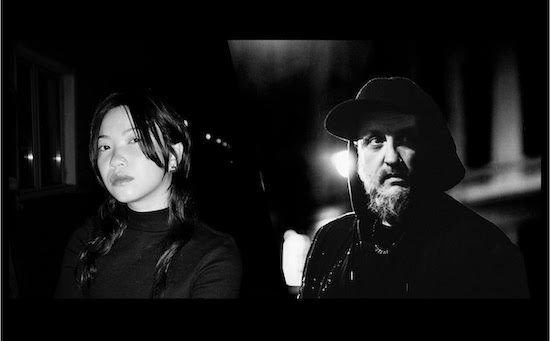The year 2020 has been an intense, paradigm-shifting lesson in many things, not least our relationship to space. Within the first few weeks of the first lockdown, our habitual patterns were upended, our spatial patterns reconfigured: where we were allowed to be, who we were allowed to be with, and how close we were allowed to be to them suddenly became the subject of government restriction. These restrictions quickly produced states of anxiety and unrest as our lives shrank, often to within a few square metres of a house or a flat, former places of safety becoming places of confinement.
Given that the dominant emotional state for many has been one of claustrophobia, it’s not surprising that this has been reflected in some of this year’s musical releases. ‘Tunnel Sound’ is the name Kevin Martin, better known as The Bug, and US-born, Berlin-based singer Felicia Chen aka Dis Fig have given to describe the mood of their dense and murky new album In Blue. Tunnels, by definition, are places of restriction, places where light is mostly absent and the human body must adjust to reductions in space. At the same time, tunnels can also amplify certain features of sound, particularly reverb, one of the most important tools in any dub technician’s tool kit, and one which is used amply on this record.
In other contexts, tunnels and railway arches have sometimes provided space to artists and musicians working at the margins. In Franco Rosso’s Babylon, one of the first films to acknowledge the impact of London’s soundsystem culture, the film’s protagonists keep their rig in a railway arch, a place of refuge from the racism and harsh economic reality outside. Kevin Martin has always acknowledged his debt to dub music, and to the Jamaican engineers who first pioneered the sound. Early dub records were in many ways about pushing outwards, creating new and unusual sonic spaces and orienting Jamaican music in a more cosmic direction. Martin’s releases, by contrast, have tended to use those techniques and turn them inwards, amplifying the feelings of angst and aggression that can be all too pervasive in urban environments such as London, which was long Martin’s base before he relocated to Berlin.
Another characteristic of Bug releases is the layer of noise, the constant crackle and fuzz, that lies on top of his basslines. This noise – almost like the type your ears start to detect when you’ve been confined to solitude for too long – is particularly prominent on In Blue, again reflecting the album’s preoccupation with confinement and isolation. Though the album was mixed entirely at Martin’s new home in Brussels during lockdown, sketches of the tracks first appeared a couple of years ago, while Martin was putting together a mix for Solid Steel Radio. For that mix, he referenced ‘Streetsweeper Riddim’, an influential early 90s release from Steely and Clivie which ushered in a more abrasive dancehall sound, stripping away even the merest hints of melody and focusing instead on hard percussive elements.
In Blue features tracks which are similarly remorseless. From the jagged and hypnotic bassline of ‘Blood’ to the narcotic states hinted at in ‘Take’, In Blue is made up of tracks suffused with dread and menace, as well as a yearning for some sort of escape. But it’s Chen’s vocals which add an extra layer of depth. Martin has long been a prolific collaborator, and the style of his vocalists has tended to gravitate one of two ways: hard and ferocious (Flowdan, Manga, MC Ride, Warrior Queen) or softer and warmer (Liz Harris, Inga Copeland, Gonjasufi). Dis Fig falls more into the latter category, but that doesn’t make her presence on the album any less intense. Like Martin, Chen seems more concerned with emotional intensity and rawness than the boundaries of genre. Dis Fig’s debut album, Purge, an unsettling exploration of extreme emotional states, was itself a product of self-imposed isolation, after she relocated temporarily to Greek island of Crete to make her record in an environment free from distractions.
As the title states, the tones and timbres of the album are blue. But it’s not the crushing, overwhelming darkness that you might expect. By the time you reach the final track, the sombre ‘End In Blue’, in which all beats have been stripped away to leave only Chen’s voice echoing against a background of drones, you get the sense that a hard and relentless journey is almost over and that just ahead, at the end of a tunnel that has sometimes felt like it would never end, there’s a glimmer of light.


